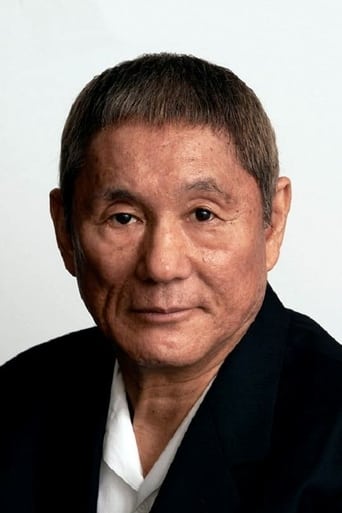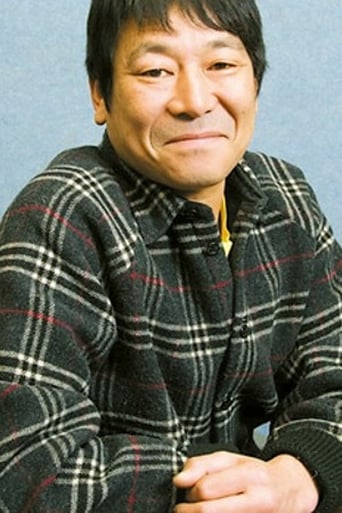Platicsco
Good story, Not enough for a whole film
FuzzyTagz
If the ambition is to provide two hours of instantly forgettable, popcorn-munching escapism, it succeeds.
Murphy Howard
I enjoyed watching this film and would recommend other to give it a try , (as I am) but this movie, although enjoyable to watch due to the better than average acting fails to add anything new to its storyline that is all too familiar to these types of movies.
Erica Derrick
By the time the dramatic fireworks start popping off, each one feels earned.
bob the moo
A local amateur baseball team has some trouble with Yakuza gangsters in the area, with the quiet and unassuming Masaki being one of those victimised the most. Pushed to the point of action, Masaki and his friend go to get a gun to challenge those thugs in power. This quest brings them into contact with the violent and erratic Uehara, who himself is losing to those within the Yakuza holding all the power.I have been using my DVD rental club to catch up on some foreign films recently and part of this has been watching the films of Takeshi Kitano. Doing this has reminded me what an odd but engaging character he is and, by extension, his films are and I continued to add a few more of his to my list. Boiling Point (not sure why, other than marketing reasons, they settled on that title given that the translation is 3rd and 4th day of a month) is sadly not one of his films that did anything for me other than put me off. It is not that it is without anything of note or merit, but more that it just doesn't hang together as an accessible piece of film. I say this with the full knowledge that Kitano's films are often an acquired taste and tend towards silence and fragmentation of timelines but here it did feel like a deliberate decision to push the audience away.With the narrative stuttering over the duration it is left to the moments to carry the film and there are not enough of them to go around. Moments of violence, sex and brutality are arresting no doubt and it is interesting to have such an abhorrent character as Uehara in a key place, but these are scattered and not developed. Instead we have the film generally moving in no specific direction in regards structure or characters and it is hard not to find it all a bit dull. The cast don't help by not making that much of an impression at any point other than scenes involving Kitano. He is not as interesting here as in other films but it is hard to ignore him as a violent force in the film. Alongside him the two boys look dull and uninteresting – a problem for them because they are supposed to be the main characters. As director and writer, Kitano may have been making cultural points (as some have suggested) and that context is required but, without the film helping me get it, I have no way to get this context and as a result the film just doesn't work for me. I'm not sold on this "context" argument because it does come from those who will not have Kitano questioned but either way the film is not a success if it cannot even serve those who are familiar with Kitano.Boiling Point is not a total waste of time as it does have moments and things of interest but as a total product it is inaccessible, dull and built on a plot that is either uninteresting, incoherent or both. Kitano's presence in the second half picks it up a little but nowhere near enough to be worthy of mention alongside the many much better films that he has made.
CountZero313
This precursor to Sonatine and Hana-bi (as well as Pulp Fiction and Jackie Brown) has all the elements that become Kitano trademarks - the skewered dark humour, deadpan expressions, misogyny, long periods of everyday life suddenly punctured by explosions of brutality. The humour works best - the beer bottle over the head gag and the confusion with the gun outside the gangsters' office being particularly memorable. The dialogue is spartan, which works most of the time, but is plodding when it doesn't, as in the reconciliation scene that ends with shared ice-lollies. The biggest sticking point is the character of Iguchi. He dominates the first half- hour, and his failure to reappear after the Okinawa sequence is unsatisfying. In fact, it spoils the whole third act. This is a bleak vision of modern Japan, strangely de-populated and amoral. It is Kitano's Japan, and if you have had some of that before, you'll lap this up. Certainly not his best, better than Sonatine but not as good as Hana-bi. But good nonetheless.
Meganeguard
Seemingly lost in his own world, Kazuo, Dankan, lives his life in a constant haze. Completely unmotivated, Kazuo's friends and colleagues almost have to force him to participate in local sandlot baseball games and his work as a gas station attendant. After one game in which Kazuo struck out without even trying to swing the bat, Kazuo gets into a scuffle with a yakuza who is a member of the Otomo group. Stating that his man's arm has been broken, the branch boss of the Otomo group pays the owner of the gas station a visit and informs him that he had better make amends with the "injured" yakuza. Learning about the scuffle, the coach of Kazuo's baseball team Ishida, a former high ranking yakuza, promises to straighten things out for the younger man. Ishida does in fact beat up the branch boss, but the man's underlings soon beat him up. In order to make amends with his coach, Kazuo and a friend make their way down to Okinawa to purchase a pistol. However, they find a bit more than what they bargained for.After being told to return some money the next day and to cut off his finger, Uehara, Beat Takeshi, takes his frustrations out on a car by repeatedly kicking the door of a car. It is at this time that Kazuo and his friend come upon the scene. Uehara, his right hand man Tamagi, and his girlfriend Fumiyo take the two men from Tokyo to a bar where amongst the smoke and karaoke Uehara and Tamagi beat up two men brutally. This is just the beginning of a couple of days of violence.Considered one of Kitano's lesser films by many, Boiling Point is a slow paced movie that has some explosive bursts of violence. Also this film displays the image of the sea that is a trademark of Kitano's films and like Sonatine, Hana-bi, and much later parodied in Takeshis', the sea is the locale of both play and violence. Also, unlike many of Kitano's other violent characters, Uehara seems to lack the tender core that made characters such as Hana-bi's Nishi likable in his stony way. However, in this film, Uehara is the type who forces his friend to have sex with his lover and thereafter beats his lover Fumiyo on the head because she should not have slept with Tamagi even though she was told to. Add to this a couple of instances of rape, one male and one female; the total package is a completely unwholesome character. Looking back, Boiling Point is indeed a flawed film, but one can see the elements that would one day make Kitano an internationally acclaimed director. Recommended for fans of Japanese film, highly recommended for fans of Kitano Takeshi.
netwallah
Strange—an elegant thug picks on a small, shy, hapless baseball player-gas station attendant, who hits him back. The yakuzas take the affront seriously, and there's a complicated multiple-layer plot, involving the main character's sudden improvement as a baseball-player—he hits a home-run but overruns the slow runner ahead of him—and somehow involving a friend and former gangster, Iguchi, who demands respect, and sends the guy to Okinawa to buy a gun. In Okinawa with the slow runner he falls in with a pair of gangsters who party all night and get guns the next day; the main gangster, played by the director "Beat" Takeshi, is casually mean to his girlfriend, and he kills the gun merchant and the very formal yakuzas who are demanding money from him. As the gas station attendant and the slow runner leave he's killed in the parking lot of the Okinawa airport. The gsa and the sr go to the yakuza headquarters with the gun, but they don't know how to take the safety off and get beaten up. The gsa takes a fuel truck and with his pretty young girlfriend crashes into the y hq in an enormous ball of flame. The movie ends as it began, in the darkness of the portable john, and then as the credits roll the gsa trots across the park to the ballfield. I don't know—it's sort of disaffected or something, the main character hardly reacting to the world, expressionless mostly. Some funny scenes, and a lot of tough talk and punching and pointless mess.







